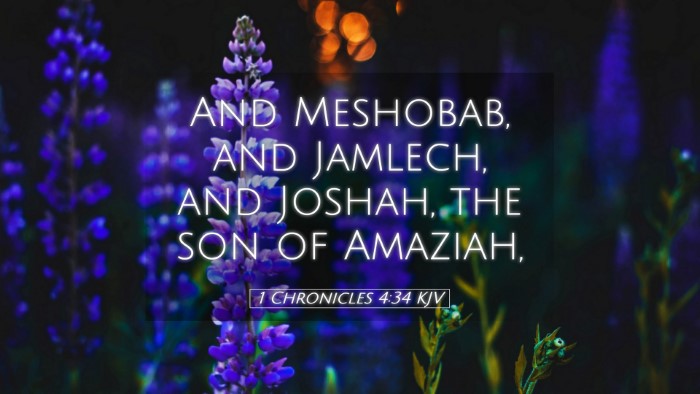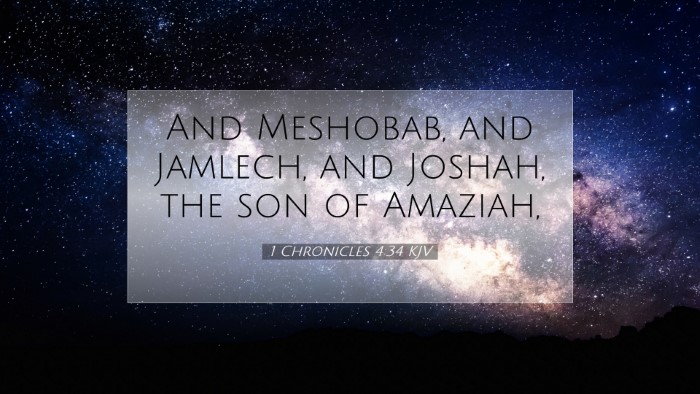Bible Commentary on 1 Chronicles 4:34
Bible Verse: 1 Chronicles 4:34 - "The sons of Mattaniah; Mattaniah was the firstborn, and his sons were Abdon, and Ahijah, and Ahitub." (ESV)
Contextual Overview
The genealogical records in 1 Chronicles serve to establish the lineage of the people of Israel, focusing on the priestly families and their roles during the time of the temple worship in Jerusalem. The verse presents a brief note on the descendants of Mattaniah, indicating the importance of family lines in the structure of Israelite worship and society.
Insights from Commentaries
Matthew Henry's Commentary
Matthew Henry notes that this passage showcases the organization of the Levites, particularly those involved in temple worship. The mention of Mattaniah serves as a reminder of the significance of the Levitical order in the spiritual life of Israel. Henry emphasizes that these genealogical details are pivotal in demonstrating how God preserved a faithful remnant and how He orchestrated the worship within His temple.
-
Importance of Genealogy: Henry highlights that genealogies provide believers with a sense of identity and connection to the historical faith. By understanding the lineage of those involved in worship, one can appreciate the continuity of God's covenant.
-
Role of Mattaniah: As the firstborn mentioned, Mattaniah's position is significant. Firstborns often carry the responsibility and honor in biblical culture, symbolizing God's primacy in choosing leaders for His people.
Albert Barnes' Notes
Albert Barnes provides contextual detail about the central role of Mattaniah as a Levite. He discusses the plural mention of Mattaniah’s sons, insinuating the continuation of priestly duties through successive generations. Barnes indicates that these names may also represent various functional roles within the temple.
-
Succession of Leadership: According to Barnes, the mention of Mattaniah's sons points to a divinely ordained process of succession within Levitical families, which was critical for maintaining order in worship practices.
-
Symbolism of Names: Each name carries deeper theological implications, suggesting the traits and roles that their bearers would fulfill in the context of worship.
Adam Clarke's Commentary
Adam Clarke brings attention to the cultural implications of the verse. He interprets the situation as reflective of the societal structure in ancient Israel where family lineage directly influenced one’s position in worship and leadership. Clarke suggests that family names often drop hints at character or destiny predetermined by God.
-
Cultural Relevance: Clarke underscores the emphasis on maintaining a family lineage within religious practice, affirming a critical connection between the physical and spiritual realms.
-
Divine Guidance: He indicates that the listing implies God’s hand in directing the affairs of His people through generations, allowing them to fulfill their roles in accordance with His divine purpose.
-
Faithfulness of Generations: The sons mentioned are also indicative of fidelity to the worship of Jehovah over generations, illustrating the crucial role of faith in everyday familial life.
Theological Implications
The implications of this verse extend beyond mere historical records; they provide insights into various theological and practical aspects relevant to contemporary believers and leaders.
-
Legacy of Faith: The commitment to pass down the faith across generations reflects God's design for His people to keep his statutes alive through familial lines.
-
Responsibility of Leaders: The calling and anointing of leaders often follow a legacy, suggesting that spiritual leadership carries both privilege and immense responsibility within the community.
-
Preservation of Worship: Understanding the descendants of significant biblical figures allows modern believers to appreciate the importance of legacy in preserving authentic worship and doctrinal fidelity.
Application for Today's Church
Engaging with passages such as 1 Chronicles 4:34 encourages current church leaders and members to reflect on their familial spiritual legacy. Here are some points of application:
-
Mentorship and Discipleship: Just as the lineage of Mattaniah reflects the importance of training future generations, churches today are called to invest in mentorship and discipleship.
-
Community Identity: Recognizing that the body of Christ is made up of diverse backgrounds yet united in purpose fosters a richer community identity among believers.
-
Cultivating Faithful Legacy: Current generations are challenged to cultivate a legacy of faithfulness to God’s Word, ensuring that their lives influence the spiritual journey of those who follow.


